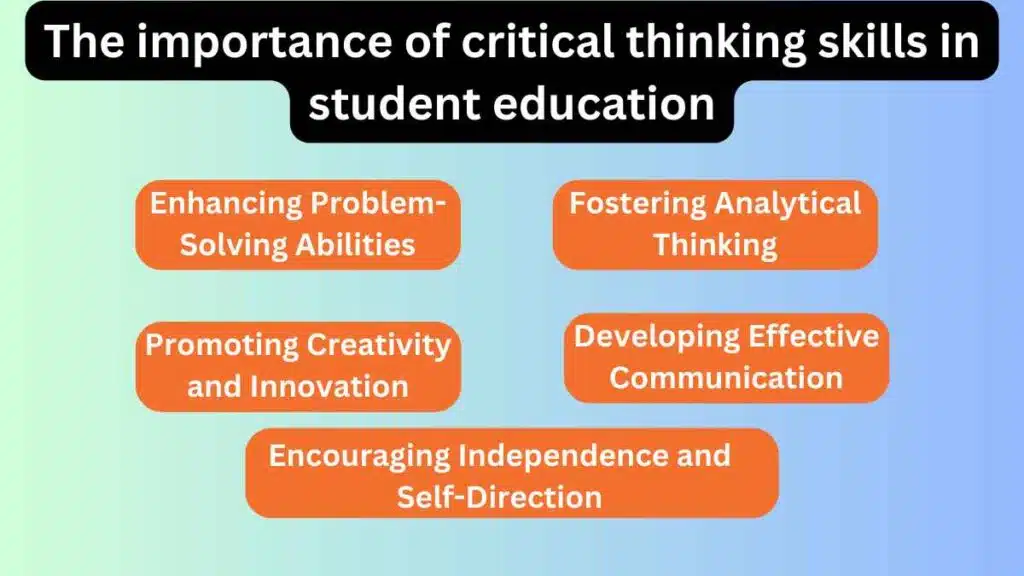The importance of critical thinking skills in student education
Critical thinking skills are the basics of modern education. It empowers students to become active, independent, and adaptable learners. Critical thinking plays a vital role in preparing students for future challenges by fostering problem-solving abilities, analytical thinking, creativity, and effective communication.
What are Critical Thinking Skills?
Critical thinking skills are the capacity to analyze, evaluate, and synthesize information objectively. It involves reasoning, problem-solving, and making informed judgments based on evidence and logical reasoning. These skills enable individuals to distinguish between fact and opinion, detect biases, and develop a deeper understanding of complex issues.
The Role of Critical Thinking Skills in Student Education

Enhancing Problem-Solving Abilities
Critical thinking equips students with the tools to tackle challenges systematically. Students can approach problems with confidence and ingenuity. They can do this by identifying potential solutions, evaluating their effectiveness, and choosing the most viable option
Fostering Analytical Thinking
Analytical thinking is at the core of critical thinking. Students trained in critical thinking can break down complex problems into manageable parts, examining each aspect closely to comprehend the bigger picture.
Promoting Creativity and Innovation
Critical thinking nurtures creativity by encouraging students to explore unconventional ideas and perspectives. It enables them to think “outside the box” and develop innovative solutions to real-world issues.
Developing Effective Communication
Effective communication is vital for success in any field. Critical thinking aids students in articulating their thoughts clearly and persuasively, helping them express complex ideas with confidence and coherence.
Encouraging Independence and Self-Direction
When students develop critical thinking skills, they become more self-reliant and proactive in their learning journey. They learn to take ownership of their education and seek knowledge independently.
Incorporating Critical Thinking in the Classroom
Implementing Active Learning Strategies
Active learning engages students in hands-on activities, discussions, and problem-solving exercises, fostering critical thinking throughout the learning process.
Encouraging Questioning and Inquiry
Teachers can stimulate critical thinking by encouraging students to ask questions, explore different viewpoints, and challenge assumptions.
Real-World Applications and Case Studies
Bringing real-world scenarios and case studies into the classroom enables students to apply critical thinking to practical situations.
Collaborative Learning Environments
Collaborative learning allows students to exchange ideas, receive feedback, and gain diverse perspectives, enhancing their critical thinking abilities.
Challenges and Benefits of Teaching Critical Thinking Skills
Overcoming Resistance to Change
Integrating critical thinking into traditional education systems may face resistance. But overcoming these challenges is essential for preparing students for a rapidly evolving world.
Benefits of Lifelong Learning
Critical thinking is not limited to academic settings; it equips students with valuable skills applicable to various aspects of life, promoting lifelong learning.
Preparing Students for the Future
In an age of automation and artificial intelligence, critical thinking skills are becoming even more vital for individuals to adapt and thrive in the future workforce.
Critical Thinking and Digital Literacy
Navigating Information Overload
In the digital age, students are bombarded with information from various sources. Critical thinking enables them to sift through this vast data and identify credible and relevant information.
Evaluating Online Sources
Critical thinking helps students become discerning consumers of information, allowing them to differentiate between reliable and misleading sources on the internet.
Cultivating Critical Thinking Beyond the Classroom
Encouraging Curiosity and Open-Mindedness
Fostering curiosity and open-mindedness outside the classroom nurtures a mindset of continuous learning and exploration.
Engaging in Thought-Provoking Activities
Reading, debates, and other thought-provoking activities stimulate critical thinking and broaden students’ horizons.
Seeking Diverse Perspectives
Exposure to diverse viewpoints helps students develop empathy and critical thinking skills by considering various angles of a topic.
Practicing Mindfulness
Mindfulness practices enhance self-awareness and promote thoughtful decision-making, contributing to the development of critical thinking skills.
Related FAQs
What is the importance of critical thinking in education?
Critical thinking is vital in education as it empowers students to analyze, evaluate, and synthesize information objectively, enabling them to make informed judgments and solve problems effectively.
What is the effect of critical thinking skills in students?
Critical thinking skills enhance students’ problem-solving abilities, foster creativity, improve communication, and promote independent learning.
What does critical thinking teach students?
Critical thinking teaches students to think critically, question assumptions, consider diverse perspectives, and make well-reasoned decisions.
Why is critical thinking important in 21st-century education?
In the 21st century, critical thinking is crucial as it prepares students to adapt to rapidly changing environments, navigate information overload, and succeed in an increasingly complex world.



Leave a Reply